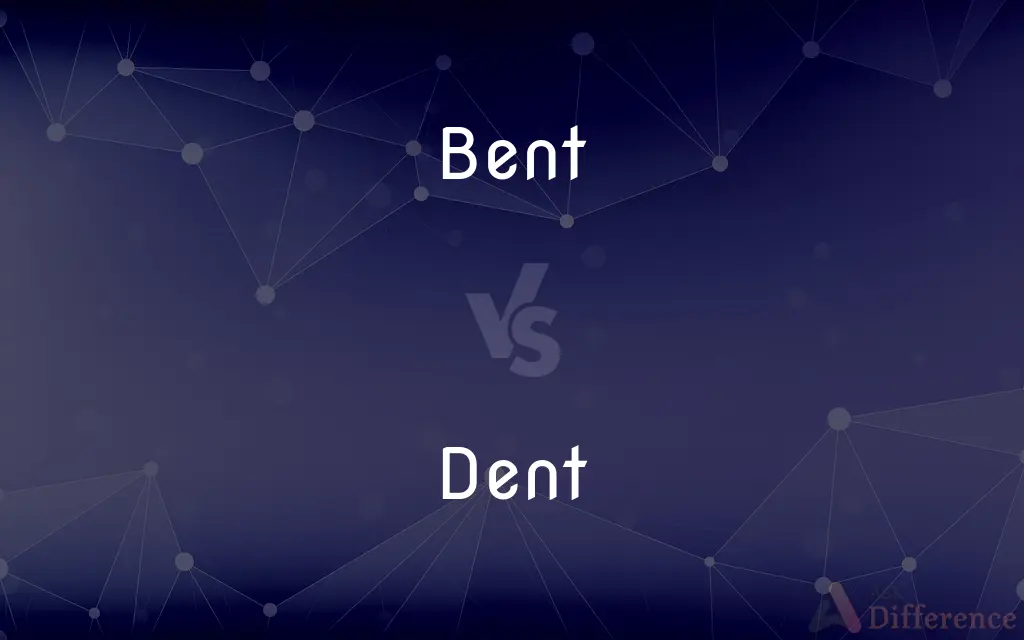Bent vs. Dent — What's the Difference?
By Tayyaba Rehman & Urooj Arif — Updated on March 18, 2024
Bent involves curving or angling from straightness, whereas a dent is a depression or hollow made by a blow or pressure.

Difference Between Bent and Dent
Table of Contents
ADVERTISEMENT
Key Differences
Bent usually refers to an item that has been curved or twisted out of its original shape, often due to force or pressure, suggesting a change from its natural, straight form. On the other hand, a dent describes a small, hollow indentation on a surface, typically resulting from an impact or pressure that compresses the material without breaking it.
While bending can occur in various materials and contexts, indicating a permanent or temporary alteration in form, a dent specifically implies a surface flaw or deformation, often seen as damage or wear. Bent objects may still retain their overall functionality or integrity, whereas a dent can suggest a compromise in aesthetic or structural quality.
Bending is a term also used metaphorically to describe flexibility or adaptability in situations or behaviors, highlighting a capacity for change or adjustment. In contrast, dents rarely carry such metaphorical usage, being more confined to physical descriptions of objects or surfaces.
The process of bending involves applying force along a certain axis to alter shape, which can be controlled or accidental. Meanwhile, dents are usually the result of sudden, often unintended impacts that leave behind a concave mark or deformation.
Bent items can sometimes be straightened or returned to their original form depending on the material and degree of bending. However, repairing a dent often requires specific techniques or tools to smooth out the indentation and restore the surface.
ADVERTISEMENT
Comparison Chart
Definition
Alteration of shape by curving or twisting.
A hollow or depression on a surface due to impact.
Cause
Applied force or pressure along an axis.
Sudden impact or concentrated pressure.
Connotation
May imply flexibility or adaptability.
Suggests damage or imperfection.
Repairability
Can often be reversed or fixed.
May require specialized techniques to repair.
Usage
Broad, including physical and metaphorical.
Primarily physical, relating to surfaces.
Compare with Definitions
Bent
Adjusted by bending.
He bent his knees to lower his center of gravity.
Dent
A noticeable effect or influence.
The new policy made a significant dent in solving the issue.
Bent
Firmly set on a course of action.
He was bent on finishing the project on time.
Dent
Physical harm that impairs the value, usefulness, or normal function.
Dropping the phone caused a dent on its edge.
Bent
Altered from a straight form to a curved one.
The metal rod was bent after the accident.
Dent
Having a concave shape or area.
The stone created a small dent in the soft ground.
Bent
Showing a preference or tendency.
She's always been bent towards artistic activities.
Dent
A small, hollow area formed by a blow.
The minor collision left a dent in the car's bumper.
Bent
Twisted out of the normal shape.
The reflection in the funhouse mirror looked bent.
Dent
A reduction in amount or intensity.
The mistake hardly made a dent in his confidence.
Bent
Past tense and past participle of bend1.
Dent
A depression in a surface made by pressure or a blow
A dent in the side of a car.
Bent
Altered from an originally straight or even condition
Picked up pieces of bent wire.
Dent
(Informal) A significant, usually diminishing effect or impression
The loss put a dent in the team's confidence.
Bent
Determined to take a course of action
I was bent on going to the concert.
Dent
(Informal) Meaningful progress; headway
At least made a dent in the work.
Bent
Chiefly British Corrupt; venal.
Dent
See tooth.
Bent
A tendency, disposition, or inclination
"The natural bent of my mind was to science" (Thomas Paine).
Dent
To make a dent in.
Bent
A transverse structural member or framework that is used for strengthening a bridge or trestle.
Dent
To become dented
A fender that dents easily.
Bent
Bentgrass.
Dent
A shallow deformation in the surface of an object, produced by an impact.
The crash produced a dent in the left side of the car.
Bent
The stiff stalk of various grasses.
Dent
(figurative) A minor impact or effect made upon something.
To make a dent
Bent
An area of grassland unbounded by hedges or fences.
Dent
A type of maize/corn with a relatively soft outer hull, and a soft type of starch that shrinks at maturity to leave an indentation in the surface of the kernel.
Bent
Simple past tense and past participle of bend
Dent
A sudden negative change, such as loss, damage, weakening, consumption or diminution, especially one produced by an external force, event or action
That purchase put a bit of a dent in my wallet.
Bent
(Of something that is usually straight) Folded, dented.
Dent
(engineering) A tooth, as of a card, a gear wheel, etc.
Bent
Corrupt, dishonest.
Dent
(weaving) A slot or a wire in a reed
Bent
Determined or insistent.
He was bent on going to Texas, but not even he could say why.
They were bent on mischief.
Dent
(transitive) To impact something, producing a dent.
Bent
(Of a person) leading a life of crime.
Dent
(intransitive) To develop a dent or dents.
Copper is soft and dents easily.
Bent
Inaccurately aimed.
That shot was so bent it left the pitch.
Dent
A stroke; a blow.
Bent
Suffering from the bends.
Dent
A slight depression, or small notch or hollow, made by a blow or by pressure; an indentation.
A blow that would have made a dent in a pound of butter.
Bent
(slang) High from both marijuana and alcohol.
Man, I am so bent right now!
Dent
A tooth, as of a card, a gear wheel, etc.
Bent
An inclination or talent.
He had a natural bent for painting.
Dent
To make a dent upon; to indent.
The houses dented with bullets.
Bent
A predisposition to act or react in a particular way.
His mind was of a technical bent.
Dent
An appreciable consequence (especially a lessening);
It made a dent in my bank account
Bent
The state of being curved, crooked, or inclined from a straight line; flexure; curvity.
The bent of a bow
Dent
A depression scratched or carved into a surface
Bent
A declivity or slope, as of a hill.
Dent
An impression in a surface (as made by a blow)
Bent
Particular direction or tendency; flexion; course.
Dent
Make a depression into;
The bicycle dented my car
Bent
(carpentry) A transverse frame of a framed structure; a subunit of framing.
Bent
Such a subunit as a component of a barn's framing, joined to other bents by girts and summer beams.
Bent
Such a subunit as a reinforcement to, or integral part of, a bridge's framing.
Bent
Tension; force of acting; energy; impetus.
Bent
Any of various stiff or reedy grasses.
Bent
A grassy area, grassland.
Bent
The old dried stalks of grasses.
Bent
Changed by pressure so as to be no longer straight; crooked; as, a bent pin; a bent lever.
Bent
Strongly inclined toward something, so as to be resolved, determined, set, etc.; - said of the mind, character, disposition, desires, etc., and used with on; as, to be bent on going to college; he is bent on mischief.
Bent
The state of being curved, crooked, or inclined from a straight line; flexure; curvity; as, the bent of a bow.
Bent
A declivity or slope, as of a hill.
Bent
A leaning or bias; proclivity; tendency of mind; inclination; disposition; purpose; aim.
With a native bent did good pursue.
Bent
Particular direction or tendency; flexion; course.
Bents and turns of the matter.
Bent
A transverse frame of a framed structure.
Bent
Tension; force of acting; energy; impetus.
The full bent and stress of the soul.
Bent
A reedlike grass; a stalk of stiff, coarse grass.
His spear a bent, both stiff and strong.
Bent
A grass of the genus Agrostis, esp. Agrostis vulgaris, or redtop. The name is also used of many other grasses, esp. in America.
Bent
Any neglected field or broken ground; a common; a moor.
Bowmen bickered upon the bent.
Bent
A relatively permanent inclination to react in a particular way;
The set of his mind was obvious
Bent
Grass for pastures and lawns especially bowling and putting greens
Bent
A special way of doing something;
He had a bent for it
He had a special knack for getting into trouble
He couldn't get the hang of it
Bent
Altered from an originally straight condition;
A bent wire
Bent
Used of the back and knees; stooped;
On bended knee
With bent (or bended) back
Bent
Used especially of the head or upper back;
A bent head and sloping shoulders
Bent
Of metal e.g.;
Bent nails
A car with a crumpled front end
Dented fenders
Common Curiosities
Can dents be repaired easily?
It depends on the material and severity, but some dents require specialized tools or techniques for repair.
What causes a bend in materials?
Bends are caused by applying force or pressure, altering the material's shape from straight to curved.
Do both terms imply damage?
"Dent" often implies damage, while "bent" can suggest intentional alteration or damage, depending on context.
Are all bends visible?
Most bends are visible, but slight bends might not be immediately apparent depending on the object and perspective.
Which is easier to fix, a bent or a dent?
This varies widely with the material and the extent of the bend or dent; some bends are easier to reverse, while some dents can be popped out.
Is there a way to prevent dents and bends?
Protective measures, such as using covers or reinforcing materials, can minimize the risk of dents and bends.
Are there any positive aspects of bending?
Bending can be a desired property in design and engineering for flexibility and resilience.
Can the process of creating a dent be controlled?
While most dents occur accidentally, certain manufacturing processes can control indentations for design purposes.
Is bending always a permanent change?
Not necessarily; some materials can be bent and then returned to their original shape.
Do bends affect the strength of a material?
Bends can affect the structural integrity of a material, sometimes weakening it along the bend.
How does a dent affect an object's value?
Dents can decrease an object's aesthetic and sometimes functional value, especially in items where appearance is important.
What types of materials are most susceptible to bending?
Materials with some flexibility, such as metals and plastics, can be more prone to bending.
Can dents be considered a form of art?
In some contexts, like metalworking or sculpture, controlled dents can be used creatively to form patterns or textures.
Can a dent also be a bend?
Technically, a dent is a specific type of deformation that usually does not involve bending but rather indenting.
How do dents form in harder materials?
Even hard materials can dent under sufficient force or impact, especially if it's a sharp or pointed object causing the pressure.
Share Your Discovery

Previous Comparison
Mature vs. Granny
Next Comparison
Manatee vs. WalrusAuthor Spotlight
Written by
Tayyaba RehmanTayyaba Rehman is a distinguished writer, currently serving as a primary contributor to askdifference.com. As a researcher in semantics and etymology, Tayyaba's passion for the complexity of languages and their distinctions has found a perfect home on the platform. Tayyaba delves into the intricacies of language, distinguishing between commonly confused words and phrases, thereby providing clarity for readers worldwide.
Co-written by
Urooj ArifUrooj is a skilled content writer at Ask Difference, known for her exceptional ability to simplify complex topics into engaging and informative content. With a passion for research and a flair for clear, concise writing, she consistently delivers articles that resonate with our diverse audience.














































